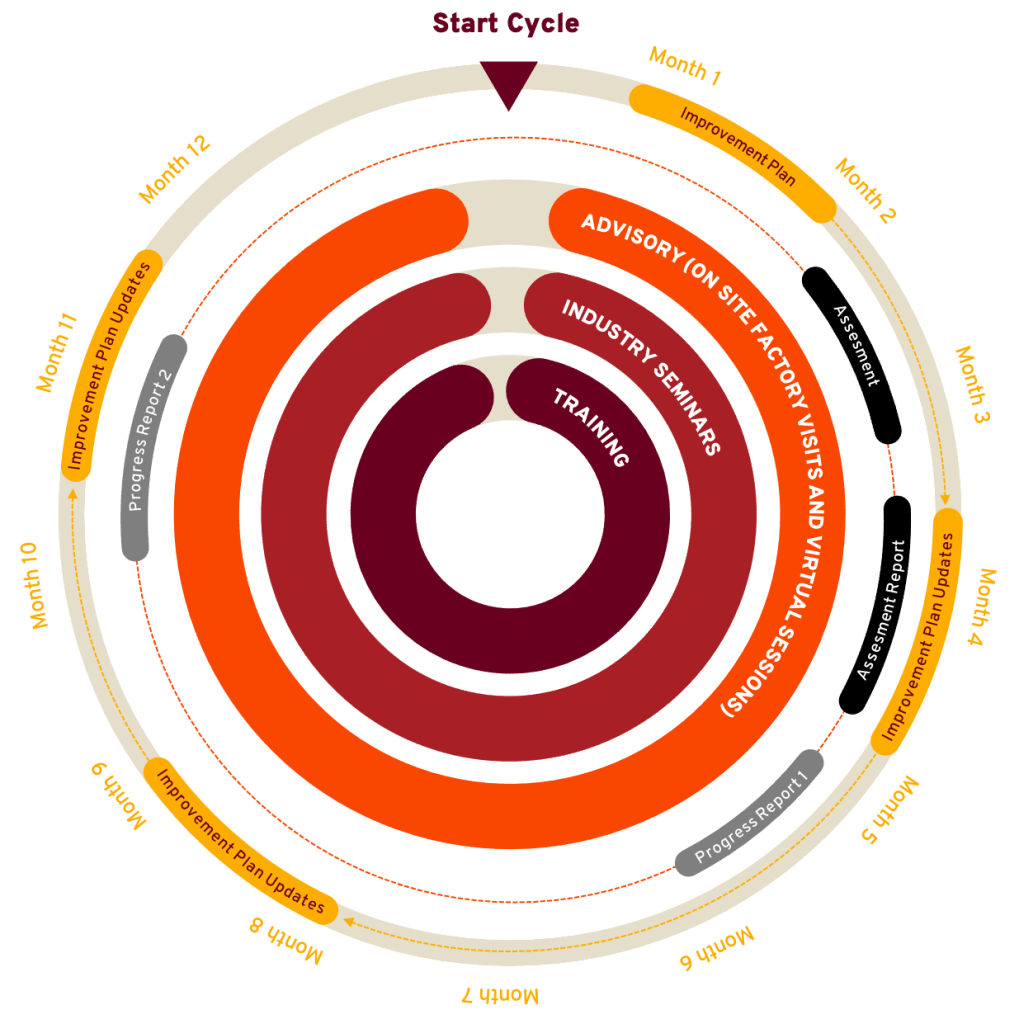Better Work’s factory engagement model aims to establish sustainable, resilient and inclusive enterprises, recognizing that such enterprises generate employment, promote decent work, are more productive and profitable, and positively impact workers and their families. Our factory work underpins our efforts to promote stronger national institutions and responsible business conduct and to scale impact to factories, sectors and countries beyond.
Guiding factories through their improvement process
Factories enrolled in Better Work go through a process of learning that includes assessments, advisory sessions, industry seminars and training. This process combines the use of in-person and virtual activities in a hybrid format to ensure that the factory engagement meets the factory’s needs and remains uninterrupted in circumstances where onsite visits might be difficult. Factories requiring a higher level of support receive a higher level of in person services, including unannounced assessment visits.
What do we cover in our assessments and learning?
Child labour
Discrimination
Forced labour
Freedom of association & collective bargaining
Contract and workplace relations
Occupational safety and health
Working hours
National labour law regulations on compensation
Through factory engagement, Better Work also aims to address the labour aspects of increasing environmental sustainability. The conditions and improvement in each factory are assessed by Better Work’s enterprise advisors based on the Compliance Assessment Tool (CAT).
Better Work Enterprise Advisors use a Compliance Assessment Tool (CAT) that is aligned with international labour standards and the national labour laws of each country in agreement with national constituents.
Our impact on firm performance
Research has shown that Better Work’s Factory Engagement Model can help factories improve profitability and reduce costs.

Increase productivity
Across all countries, training through our Supervisory Skills Training increased the productivity of lines run by trained supervisors, especially women, by 22%.
Higher profits
In Vietnam, the average firm enrolled in Better Work increased its revenue to cost ratio by 25% after four years of participation.
Order size
Firms that make progress on key issues, such as pay and working hours, typically see an increase in order sizes from buyers.
Fewer audits
International experience shows that Better Work factories have fewer audits, saving both time and money.
Innovation and Evolution of Our Model
Maintaining operations during the COVID-19 pandemic required innovation and prompted a faster evolution of new work modalities, which have now been integrated throughout our factory engagement model.
Our model is built on ensuring the continued agility and efficiency of factory engagement through hybrid training, advisory sessions and assessments, as well as collaboration with national constituents and other key partners in factory engagement, as appropriate.
In order to help strengthen supplier capacity, accountability, resilience and ownership, the engagement model also promotes the role of Factory Ambassadors – who are existing factory representatives that receive specialized training to support sustainable compliance with international labour law – in addition to leveraging opportunities for group level advisory services and tailored learning, as well as the development of enterprise roadmaps and thematic diagnostics.
These forms of engagement are underpinned by an investment in stronger data, systems and technology for maximal efficiency and impact.
Download Better Work Factory Engagement model to learn more.